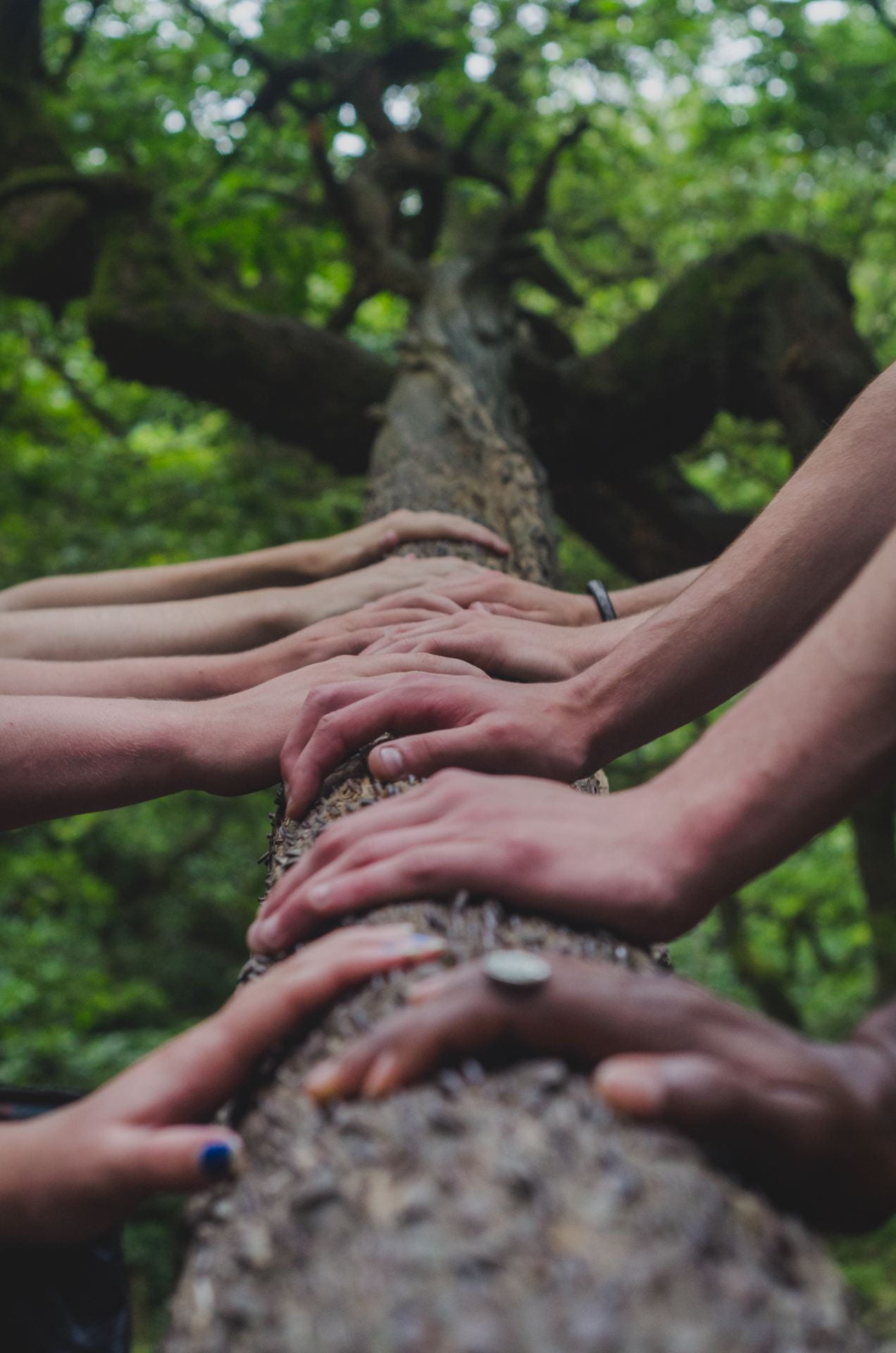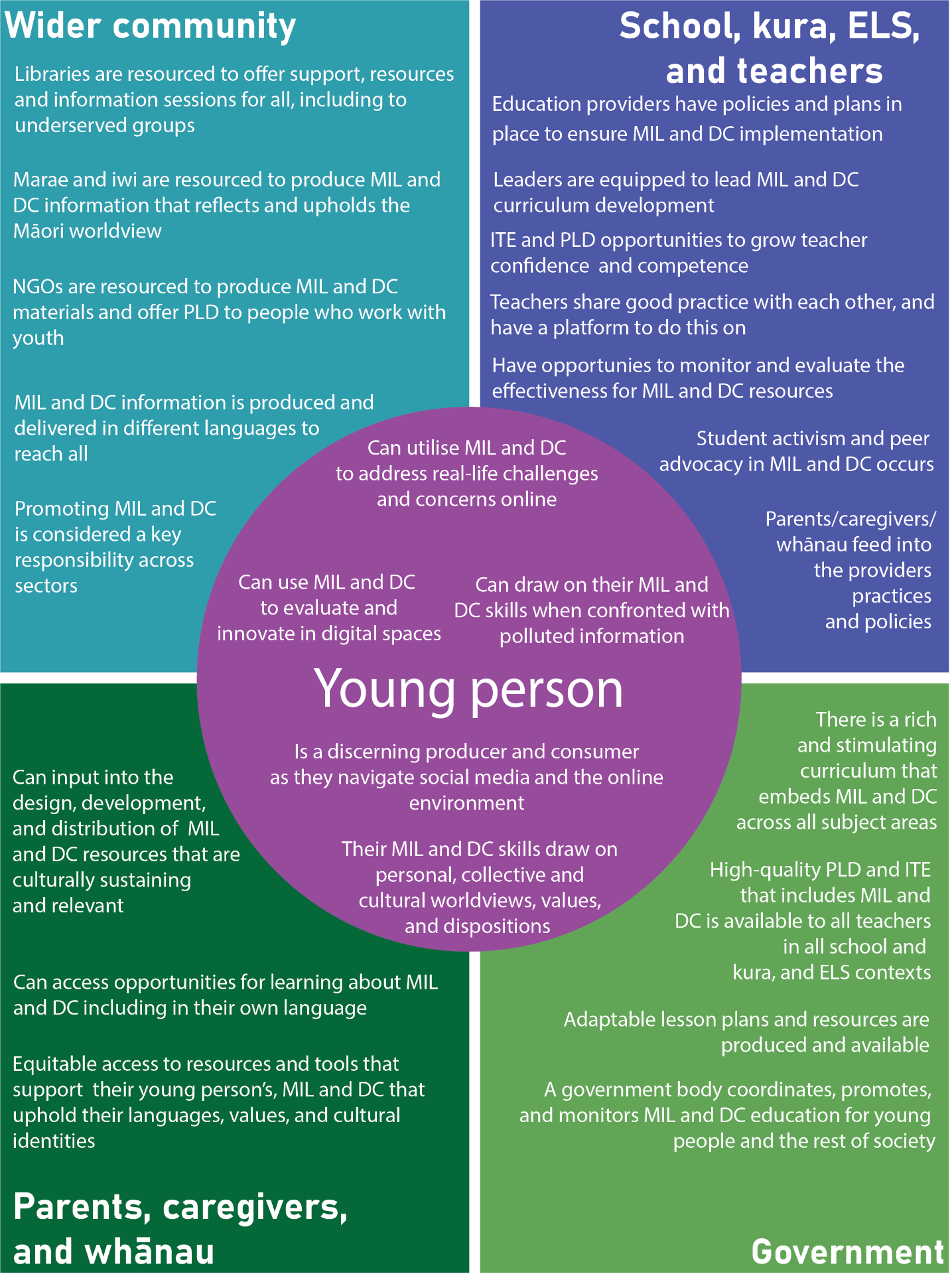He Uru Kahikatea: building young people’s resilience through media and information literacy and digital citizenship skills
Executive summary
These key messages provide a snapshot of the full report, and are elaborated in this executive summary.
Polluted information
- We use polluted information as a collective term for all types of contested information contributing to an online environment that causes harm to young people. This includes misinformation, disinformation and malinformation.
- Polluted information can cause harm; it is not restricted to the online environment or social media but has been amplified by them; enhanced media and information literacy and digital citizenship skills can protect young people from harm.

Media and information literacy and digital citizenship
- The online environment offers both opportunities and risks for young people. They need to be equipped with tools and strategies to maximise benefits and minimise harms.
- Media and information literacy and digital citizenship are needed to ensure young people can be resilient, especially in the context of a rapidly changing online environment.
- Beyond existing strengths in specialist media education, and in other parts of the curricula, media and information literacy and digital citizenship are most successfully learned when they are embedded in and across all curriculum learning areas.
- Digital skills, critical thinking, and social emotional skills are all foundational parts of media and information literacy and digital citizenship, and young people, whānau, and teachers need to be supported to have a baseline of these skills.
- Young people need access to media and information literacy and digital citizenship resources and strategies they can use for interacting with and supporting their peers.
Initial teacher education and in-service professional learning and development
- Initial teacher education (ITE) and in-service professional learning and development (PLD) already include critical analysis skills but should explicitly include opportunities for learning about media and information literacy and digital citizenship to equip teachers with the skills needed for their resilience as well as for teaching young people.

Support for schools, kura, and teachers
- Leaders in schools, kura, and Early Learning Services (ELS) need support to help grow teachers’ confidence and competence in teaching media and information literacy and digital citizenship.
- Teachers need to be supported by resources and adaptable lesson plans for teaching that reflect different learning stages and disciplines, are relevant for the Aotearoa New Zealand context, and are numerous enough to be drawn on throughout the year.
- Parents, caregivers, and whānau need to be included in school, kura, and ELS initiatives with a view to increasing their understanding and ability to support young people in media and information literacy and digital citizenship.
Equity and Te Tiriti
- English medium schools, Māori medium schools, kura kaupapa Māori, and ELS will uphold Te Tiriti o Waitangi by ensuring equity in access and outcomes in media and information literacy and digital citizenship education for rangatahi Māori and communities (whānau, hapū, iwi).
- Programmes, resources, and adaptable lesson plans that are made by, alongside and with diverse communities including: Māori, Pacific, immigrants, refugees, neurodiverse, rural communities, disabled, and LGBTQI+ are all important in the New Zealand context.
A national approach, locally led
- A national strategy can be helpful in guiding media and information literacy and digital citizenship in the education system.
- A national level approach, whole of school approach, and classroom level approach to media and information literacy and digital citizenship, are all critical. Community expertise should also be integrated wherever possible.

Libraries
- Libraries and librarians already have expertise in media and information literacy and digital citizenship and can play a central role in designing and facilitating media and information literacy and digital citizenship initiatives – particularly as a means of growing collective community understanding, agency, and action.
- They need resourcing and support to do this, both to access qualified librarians and to upskill other staff through professional development.
Developing effective tools and measuring progress
- Meaningful measures of media and information literacy and digital citizenship capability for both young people and teachers are needed to evaluate success. These are not widely available, and challenging to design. Currently available measures that can be used for tracking effectiveness have been critiqued for their utility in New Zealand.
- Research and development is needed for designing effective instructional tools and measures that are fit for purpose and reflect the unique context of New Zealand.
Summary diagram
Figure 1 below summarises the key themes of this report. Central to mitigating the effects of polluted information and to developing positive skills for social media and the internet is the young person’s strengths, not just as an individual but as part of a collective. Supporting the development of media and information literacy and digital citizenship requires a coherent and systematic national response involving schools, kura, ELS, teachers, school leaders, parents, caregivers, whānau, the wider community, and government.

Figure 1: Centring the media and information literacy and digital citizenship system around the young person. MIL = Media and information literacy, DC = Digital citizenship.
Published: 15 December 2023
Last edited: 15 December 2023
